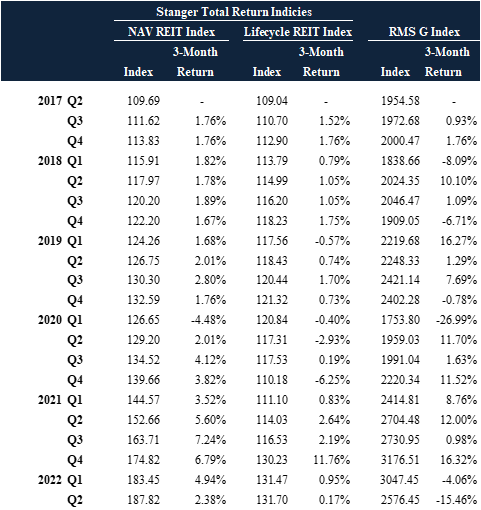NAV REITs Post a Cumulative 71% Total Return Over Past 5 Years

Non-traded net asset value real estate investment trusts posted a 2.4 percent return for second quarter 2022, as measured by the Stanger NAV REIT Total Return Index.
Non-traded net asset value real estate investment trusts posted a 2.4 percent return for second quarter 2022, as measured by the Stanger NAV REIT Total Return Index.
Investment banking firm, Robert A. Stanger & Co. reported that the index “took a moderate dip” in first quarter 2020 but has since risen continuously every quarter.
Non-traded NAV REIT returns have outpaced those of their traded counterparts with a cumulative total return of 71.2 percent over the last 60 months.
In comparison, the MSCI US REIT Index Gross Total Return (RMS G), a measure of performance of publicly traded REITs, rose 16.3 percent in the fourth quarter on a strong stock market and continued its first quarter downward momentum, falling 15.5 percent in the second quarter 2022. Over the last 60 months, the cumulative total return of this broader REIT market index (31.8 percent) was less than half that of the Stanger NAV REIT Index.
The chart below illustrates the impact that stock market volatility plays in listed REIT securities values relative to non-traded REITs.

“This performance highlights the benefits of a non-listed NAV REIT vehicle, that historically has provided a mostly steady real estate-based return without the extreme ongoing volatility of the traded market,” according to Kevin T. Gannon, chairman and chief executive officer of Stanger. “This strong performance is the driving force behind $21.3 billion of NAV REIT fundraising in the first half of 2022.”
The IPA/Stanger Monitor tracks the individual performance of 39 non-traded REITs with a combined market capitalization of more than $114 billion.
According to Stanger, over the last 12 months, the top performing non-traded NAV REIT was Cottonwood Communities (Class A at 96.9 percent), and the top performing traditional lifecycle REIT was SmartStop Self Storage REIT (Class A at 51.3 percent).
Over a five-year period, Blackstone Real Estate Income Trust (Class I at 13.9 percent annualized) was the top performing NAV REIT, and SmartStop Self Storage REIT (Class A at 14.1 percent annualized) was the top performing traditional REIT.
The IPA/Stanger Monitor, sponsored by the Institute for Portfolio Alternatives and authored and published by Stanger, also covers 14 non-traded business development companies, with a combined market capitalization of $26 billion.
“In a time of market volatility and high inflation, non-listed REITs and in particular the NAV REIT structure, continue their strong performance, highlighting the portfolio diversifying benefits of real estate and its ability to improve a portfolio’s overall performance,” said Anya Coverman, senior vice president, government affairs and general counsel of the Institute for Portfolio Alternatives.
“Our latest data substantiates what wealthy and institutional investors have known for years, that NAV REITs deliver strong returns with less volatility risk, improving a portfolio’s overall performance,” said Gannon.
In related news, Stanger reported that fundraising for non-traded alternative investments hit $62 billion during the first half of the year.
Robert A. Stanger & Co., Inc., founded in 1978, is an investment banking firm specializing in providing investment banking, financial advisory, fairness opinion and asset and securities valuation services to partnerships, real estate investment trusts and real estate advisory and management companies in support of strategic planning, capital formation and financings, mergers, acquisitions, reorganizations, and consolidations.